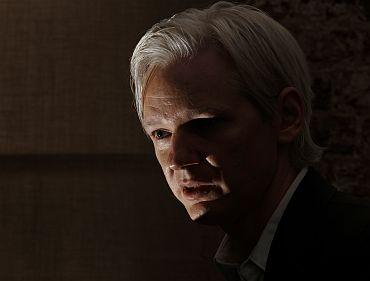 Whistle-blower website WikiLeaks founder Julian Assange, who was arrested in London on Tuesday on rape charges after remaining incommunicado for nearly a week, was sent to custody after being denied bail by a British court.
Whistle-blower website WikiLeaks founder Julian Assange, who was arrested in London on Tuesday on rape charges after remaining incommunicado for nearly a week, was sent to custody after being denied bail by a British court.
Assange, an Australian citizen, was arrested by the Metropolitan police on the basis of an arrest warrant issued from Sweden related to allegations of sexual assaults against him.
Assange was later produced before the Westminster Magistrates Court where he was denied bail. After being refused bail on charges of allegedly sexually assaulted two women in Sweden, Assange was remanded in custody pending a full hearing on December 14.
Assange told a judge at City of Westminster Magistrates' Court that he would contest his extradition to Sweden.
In a statement, the police said, "Officers from the Metropolitan Police Extradition Unit have this morning arrested Julian Assange on behalf of the Swedish authorities on suspicion of rape."
Assange "was arrested on a European Arrest Warrant by appointment at a London police station at 9.30 am. He is accused by the Swedish authorities of one count of unlawful coercion, two counts of sexual molestation and one count of rape, all alleged to have been committed in August 2010."
Soon after he was taken into custody, a spokesman for WikiLeaks said the arrest will not stop the release of more secret files. The extradition of Assange may take a long time due to legal challenges, but it can be swift if the accused waives his legal rights.
Assange's supporters have written an open letter to Australian Prime Minister Julia Gillard, asking her to protect him.
One of the signatories, prominent barrister Julian Burnside said, "First and foremost Julian Assange is an Australian citizen who is entitled to the protection of his country and does not deserve to be betrayed by his country. Julia Gillard has been making it virtually impossible for Assange to return to Australia where he is entitled to be. And she has even threatened to cancel his passport. That is an outrageous stance to take."
In an opinion piece for The Australian newspaper after his arrest, Assange said the whistle-blowing website was 'fearlessly' exposing facts in public interest.
Assange likened his campaign to the World War I reporting of Keith Murdoch, the father of media baron Rupert Murdoch, which excoriated British generals' leadership of the Gallipoli campaign in which thousands of Australians died.









 © 2025
© 2025